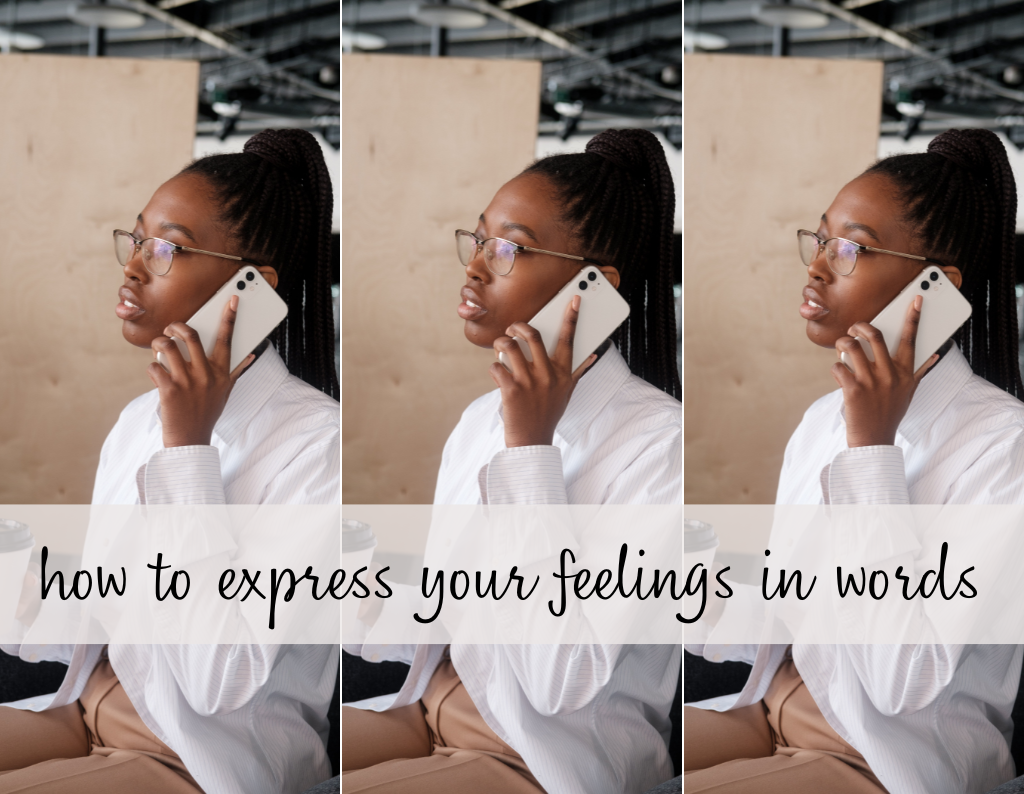This post may contain affiliate links, which means I’ll receive a commission if you purchase through my link, at no extra cost to you. Please read full disclosure here.
Learning how to express your feelings in words is a fundamental skill for bettering your friendships, deepening romantic relationships, and feeling more confident in yourself.
While accepting your feelings, knowing how to describe your feelings, and practicing verbalizing your emotions are all great skills, there is truly so much to learn when it comes to expressing yourself!
That’s why today, I’m helping you get better at expressing your feelings with a comprehensive list of tips that will transform your approach!
By the end of this article, you’ll know exactly how to strategically express your feelings in words.
This post is all about how to express your feelings in words.
How to Express Your Feelings in Words
Why can’t I explain my feelings?
It is much easier to share the thoughts that swirl inside your mind all day, than it is to express your feelings. While both genders struggle with this, women tend to experience great difficulty accepting and articulating their emotions.
So, if you’re asking yourself why can’t I put my emotions into words, know that you are not alone. Sharing the depths of your feelings is a vulnerable act–one that requires great strength and courage!
Also, exposing your inner emotions can feel like a huge risk–especially when you are used to self-sabotaging, withholding your feelings in order to make others comfortable.
However, knowing how to express your feelings in words is actually the very thing that will develop the intimacy and depth you likely seek out in relationships.
By properly identifying and sharing your feelings, you can build your connections with colleagues, friends, family members, and your partner in a more genuine, authentic way.
This is why, although you may fear opening up, or scared of rejection, bottling up your emotions is counterintuitive: it is not a healthy, productive way to develop emotional intelligence.
Below, you’ll find an inspiring list of pointers so that you know how to communicate your emotions in words.
How do you express your feelings through words?
Emotions happen to all of us regularly: think about it, we are constantly interacting with others and using our five senses to decipher the world around us.
As we’ve discussed, many of us struggle to verbalize and label our feelings because finding the words to tactfully express them is not easy!
Yet, one thing you may have never asked yourself is what if you don’t express your feelings… And unfortunately, there are consequences for letting your emotions boil over:
A person who cannot accurately share their feelings will see negative impacts on their physical and mental wellbeing. And as a community of wellness enthusiasts, I don’t see that jiving with our values and priorities!
So in order to avoid extra emotional labor and maintain a thriving social well-being, let’s jump into the best advice for learning how to express your feelings in words.
1. Identify and label your emotions
One of the biggest factors for reaching emotional acceptance entails identifying your emotions and labeling your feelings from an objective stance.
In order to put them into words, you need to characterize them first!
Slow down and categorize your thoughts. Listen to their true nature and let them exist without passing judgment, denying them, or shutting them out.
2. Don’t worry about being perfect
Know that verbalizing your emotions can be extremely scary and painful at first. There is no expectation for you to be a star at this the first time around!
My biggest recommendation here is to stop comparing yourself to people that have been practicing expressing their feelings for a long time. You are on your own unique journey!
- Log off social media if it will help you stay focused
- Celebrate the little wins (they’re what add up to the big ones down the line!)
- Stay true to your values
- Trust the process!
3. Practice mindfulness
Another crucial tip for communicating your emotions is grounding yourself in the present moment and being aware of your thoughts.
True emotion maturity is built when you are able to observe your thoughts and master your brain–instead of allowing it to master you!
Once you have this mindful awareness, you will be better able to translate your brain activity into your emotional senses.
Additionally, if you have difficulty summarizing your thoughts, and constantly ask yourself how can I express my feelings in one word, that is ok too.
Most feelings can be summed up into a simple, single word:
- Angry
- Happy
- Frustrated
- Sad
- Lonely
- Hurt
- Scared
4. Be intentionally vulnerable
Your friends and family members cannot read your mind! So when verbalizing your feelings, make sure you are sharing the deeper, underlying emotions you’re experiencing.
Allow yourself to go beyond surface level explanations. Know that by being vulnerable and raw, you are encouraging those around you to match your energy. And this is something to truly be proud of!
On this note, one of my favorite how to express your feelings in words quotes is:
“The hardest thing in life is having feelings in your heart that you can’t put into words.”
selfassemblyguide.com
And while I’m positive many have felt this throughout our lives, we do not need to live in this place forever. Dig deep, feel the fear, and take the risk anyways!
5. Use body language
Also, it helps to leverage your physical body when expressing your feelings in words.
Use your body language skills–eye contact, soft gestures, comfortable posture–to indicate that you’re present and invested in the person you’re engaging with.
6. Write them down first
Another incredible tip for expressing your feelings is taking the time to journal them out before speaking to someone about them.
Related Posts
19 Inspiring Vision Board Prompts: All the Top Vision Board Ideas For Women
29+ Life-Changing Wellness Goals to Start This Year
49 Uplifting Spiritual Wellness Activities: How to Improve Spiritual Wellness
7. Be honest with yourself
Next, make sure you are forthcoming and honest about how you’re feeling. Don’t let the fear of taking this leap overshadow you!
And I know you may feel “bad” for expressing yourself. Every person’s upbringing and background influence how they see emotions. You may have a strong association to pain and suffering when it comes to divulging your feelings.
However, if you never start learning how to deal with your emotions constructively, you will never overcome the hurdle you’re currently facing. Be brave!
8. Remember this is a season, not forever
One of the most helpful things when sharing your emotions is knowing that they are temporary. This point in life is a season, not forever!
So whether you’re feeling extremely motivated, lacking direction, or in an isolated time of your life, know that repeated affirmations and self-soothing will make it so much more realistic to assert yourself.
9. Be brave
While we’ve touched on being courageous throughout this post, it is most relevant when understanding how to express your feelings to someone you love in words.
Romantic relationships are full of emotional moments. While it may feel daunting at times, it is important to truly assess and attribute the overall emotional energy surrounding the partnership.
Once you feel you have a clear definition in your head, it is equally as important that you slowly, and at your own pace, confide in your partner. Do not let your feelings sit trapped within you.
10. Create a comfortable environment
Make sure that when you do sit down with someone to share your emotions, you are in a space that feels inviting and comfortable!
Here are some items to lighten your space to create room for deeper conversations:
11. Focus on your breath
Staying in line with meditation, be sure to focus on your breathing and body sensations as you characterize your emotions with words.
Noticing these inner expressions will guide the conversation further, and give you a better understanding of your level of comfortability as well.
This is one of many expressing feelings examples that emphasizes full body alignment!
12. Be patient with yourself
The process of mastering your emotions and knowing how to have conversations about them is a long game.
Taking ownership of your mental status is ultimately an act of self love. So be patient and kind to yourself–every day, you are gradually evolving!
13. Limit distractions
If it is going to help you pay closer attention to your emotional health, I strongly recommend limiting your screen time and other obvious distractions.
Your time is your most valuable asset–so don’t be so willing to give it away to people and things that are not aligned with your core values.
14. Know your why
- Are you hoping to deepen the relationships in your life?
- Are you hoping to feel heard and seen for the first time?
- Is this a step in the right direction or your social well-being?
As I always say: when you have a strong enough why, you can conquer any HOW.
15. Focus on your goals
In addition, when starting up a conversation about your emotions, it is important to identify the ideal outcome from the talk.
- Do you want this to end with a new sense of connection and an open line of communication?
- Are you trying to express your feelings and distance yourself from the other person?
- Would you like to receive advice or guidance, or are you simply attempting to verbalize your thoughts?
16. Balance your emotion and your brain
Overcoming the fear of explaining how we feel is extremely uplifting: and something that gets accomplished when we learn to balance our mind and our heart.
By focusing on your spiritual wellness practices, you can better understand how to distinguish the two, and how to leverage your spiritual guides to put emotion into words!
17. Practice positive self talk
Also, if you’re still asking yourself, how do you express feelings in a sentence, practicing positive self talk will really help you out!
When you keep your mind a generally happy and inspiring place, you’re able to define your thoughts more directly.
Instead of mumbling or speaking in broken phrases, you’ll be able to succinctly state your feelings in an understandable fashion.
18. Don’t let yourself feel guilty
This may be one of the most transformative tips on the list: do not feel bad for communicating your feelings!
As long as you have the right intentions, you have nothing to be ashamed of. You cannot spend your life hiding from how you feel in order to make others feel okay.
The only one you’re hurting in that scenario is yourself!
At the end of the day, all you can focus on is being truthful and open–not on how others perceive or react to your statements.
Related Posts
Must-Know Sunday Reset Routine: Top Sunday Reset Ideas for a Better Week
13 Best Self Love Podcasts You Need to Know About
15 Best Self Discovery Books to Uncover Your Highest Self
19. Articulate your feelings appropriately
When you are learning how to express your feelings in words to someone, it is common to struggle articulating your feelings with the correct vocabulary.
Ensuring that you use more complex, specific terms to attribute your emotions makes the act of sharing how you feel much more beneficial and effective.
Here are some examples:
- Agitated
- Homesick
- Amused
- Optimistic
- Shocked
- Passionate
- Worried
20. Have a positive tone to start
Additionally, it is important to begin sharing how you feel with a positive, kind tone. Others are much more likely to engage in emotionally sensitive topics when they feel respected and comfortable participating in conversation.
You must be open, honest, and prepared to divulge your feelings–and to listen to how the person you’re engaging with feels, too!
21. Organize your thoughts
Think of this method as an emotional vision board: put your thoughts into organized buckets!
When entering a conversation and sharing the depths of your mind, the flow of the talk will go much better if you have a clear, rational perspective.
22. Use “I” statements
This one is sooo important!! Be sure to frame your feelings from an “I” stance, NOT from a “you” have issues, did this to me, are imperfect, etc. stance!
Here are some examples:
I statements-
I feel discouraged when you…
I feel frustrated when you…
Versus you statements-
You don’t understand me when I…
You are damaged from your childhood so you can’t be supportive of me when I…
23. Practice makes perfect!
Finally, please know that the process of understanding how to express your feelings in words takes a long time. Practice truly does make perfect.
The more you allow yourself to articulate your emotions without fear of the outcome, the stronger your emotional intelligence becomes.
Before you know it, you’ll be more in tune with yourself and those around you than you could’ve ever imagined!
How to Express Your Feelings in Words: Wrapping it Up
Are you using any of these strategies to better communicate your feelings in the future? Let me know in the comments!







Leave a Reply